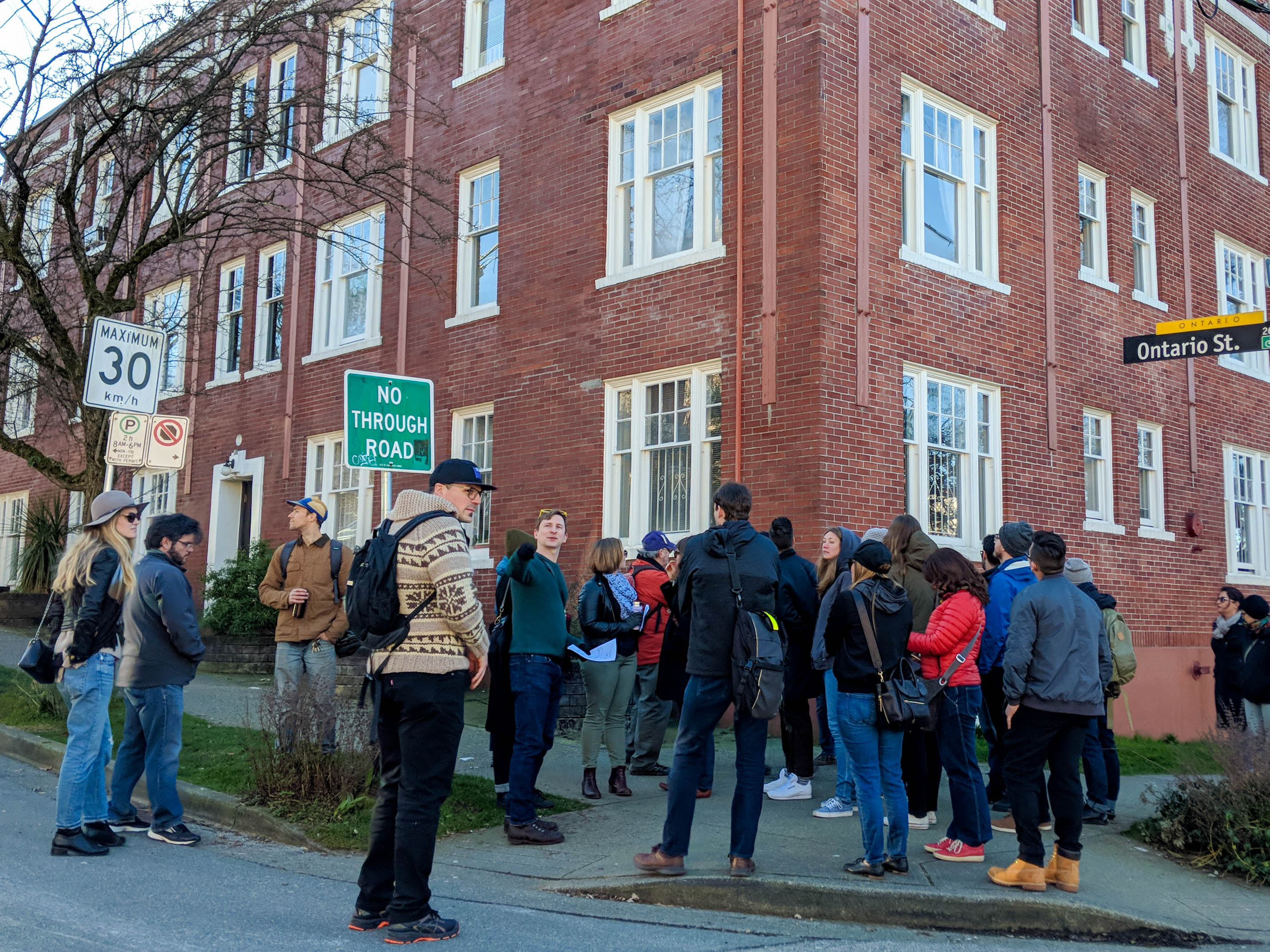[Editor’s note: We are profiling new housing advocacy groups in Vancouver by presenting in their own words how they are tackling unaffordability.]
Abundant Housing Vancouver

A housing advocacy group that supports additional housing of all types in Metro Vancouver "because when housing choices are limited, the wealthy always win."
Start date: June 2016
Funded by: Members and external donations.
Key people and membership: We're a group of young Vancouverites, mostly renters. Some of us grew up here and some of us moved here for the opportunities that can only be found in big cities. We come from a wide variety of backgrounds and work in a lot of different industries.
Website: abundanthousingvancouver.com
How did you get started?
A bunch of us met in 2016 at the public hearing for a six-storey rental building on Commercial Drive (3365 Commercial). There was a lot of opposition to that - mostly people who own $2 million houses saying that Commercial Drive doesn't need more rental homes - so we showed up to voice our support. The apartments were eventually approved and we decided to keep the ball rolling!
Your take on housing in Vancouver?
We believe that everyone who wants to should be able to afford a home in Vancouver - but that's not easy when our rental vacancy rate is below one per cent. Vancouver's zoning has excluded apartment buildings from most neighbourhoods since the late 1920s, and we believe that this is a major contributor to today's housing problems.
North American cities are becoming denser, more walkable, more sustainable, and shifting toward transit over automobiles. We really celebrate those changes. Vancouver is still very suburban south of 16th Avenue, and west of Arbutus Street. We'd like to see lots of small apartment buildings on small lots in the "suburban"-style parts of Vancouver.
What action would you like to see happen?
Build housing, tax land.
We have a real shortage of rental housing, and we'd like to see much more built in wealthy neighbourhoods, on quiet streets and near amenities and job centres (like UBC, the beaches, and VGH). Many municipalities have failed to build rental housing for 40 years, and even Vancouver has banned apartments on most of its land. Cities should reverse those policies immediately, and the province should encourage them to do so.
Meanwhile, land value increases have pushed up rents and purchase prices. This has made us a very rich city, so we could solve this if we chose to. We strongly support tax changes to capture some of that increase in value and use it for affordable housing, even though our core focus is on zoning reform.
Tell us about your Vancouver's Worst Zoning tour.
So, most of Vancouver's residential land is zoned to keep apartment buildings out, but some neighbourhoods are worse than others. The part of Point Grey near UBC and Spanish Banks is effectively zoned for massive mansions. It's illegal to build on lots smaller than 18,000 square feet or 150 feet wide. One of the first things we did as a group was organize a tour of North West Point Grey in 2016 to show people what mansion-only zoning looks like. Only about 10 people showed up, but we had a fun time. When we held the same tour again a year later, 70 people - including multiple council candidates and a TV reporter - showed up. People are starting to notice and care about exclusionary zoning.
What makes your group unique compared to other housing advocacy groups?
We try to offer a hopeful, positive vision for Vancouver with realistic steps to get there. We believe low-density zoning is a big problem but not the only problem - we're happy that other groups are tackling other aspects of the housing crisis.
Who inspires you?
UBC students who organized to demand that Vancouver legalize secondary suites in the 1960s. It still took over 40 years after that for Vancouver to fully legalize secondary suites!

Start date: April 2017
Funded by: Individual donations, a grant.
Key people: A steering committee of 13 from a variety of backgrounds.
Members: Over 800.
Website: vancouvertenantsunion.ca
How did your group get started?
We held a launch event last spring where approximately 200 people came out to show interest and to sign up. We are made up of individuals committed to building a transformative movement for housing justice and housing rights for tenants: people who do not own property, people who rent, people who do not have stable housing, people who are homeless.
How do you view the rental housing situation in Vancouver?
Being on unceded land means all of these housing struggles have roots in colonization, theft and displacement. Vancouver continues these patterns in the investments, lack of regulations and speculation that results in rapid gentrification and displacement.
Because rents are going up so quickly, there is a major incentive for landlords to find ways to kick tenants out without cause so they can reap the rewards of this out-of-control market.
A lot of what we deal with as advocates are causeless evictions, such as renovictions. This is a major burden for tenants who reenter a rental market to face a vacancy rate below one per cent and higher rents.
What actions would you like to see?
Stronger protection of renters in the form of vacancy control (where rent is tied to the unit), a temporary rent freeze, a change to the Residential Tenancy Branch to shift the onus to landlords to apply for evictions and set dispute hearings, increases of welfare and disability rates and a massive reinvestment in social housing, especially by the federal government.
There has been no shortage of speculative wealth created in the housing market to fund any of these initiatives.
Also, the city should not be approving the development of luxury condos in the midst of a housing crisis - period. Affordability should be a baseline requirement of any development, not an additional "amenity" or "benefit" provided to the community. That means welfare rate housing and housing built at rates that are based on people's incomes. We also want the city to enforce its bylaws to actually dissuade landlords from letting their buildings fall into disrepair.
What are some of your impacts?
We've directly prevented over 20 renovictions and dissuaded many more. We have repeatedly beat the professionalized eviction "consultants" and $400-an-hour lawyers of landlords at arbitration with the Residential Tenancy Branch and expect to continue doing so.
We also hosted a convention in November where we hosted similar housing justice groups from the U.S. and other Canadian cities. It was incredible to have folks share their knowledge from successful battles, rent strikes, forming tenants unions and fighting back. Over 200 people came throughout the day as part of the week of National Action for Housing Justice.
What sets you apart from other housing groups?
We are more than an advocacy provider, and always work to empower tenants politically by organizing them around their collective interests and protect themselves from the threats, intimidation and bribes that lead to the loss of their homes. We want to be able to do on-the-ground mass tenant organizing and advocacy while also pushing for better legislation for tenants from all levels of government.
At the policy level, we are focused on the retention of existing affordable housing, renter protections and the construction of new social housing. We strongly distrust the popular narrative of a market-driven "supply" solution to the housing crisis, which is doomed to failure without addressing speculation or making requirements of unit affordability.
Additionally, there is the reality of a large population of working class and low-income people in need of adequate housing that the market will simply never provide of its own accord.
What places inspire you?
Social housing in Vienna, rent control and affordability in Montreal, the strength of the social welfare net in Denmark and Sweden and many, many examples of collective care and community in different Indigenous societies and structures.
Where do you hope to see the city in a decade?
We want to see a shift in political terrain where tenants have as much influence as property owners or developers in shaping not just what Vancouver looks like, but who the city is for.
Housing is a human right. Everyone deserves to live with dignity in a safe, secure, clean, affordable and accessible home. We reject that housing can or should be seen as an "investment" or an avenue to make money, and we reject all forms of displacement on the Indigenous lands we organize on.
Part two: advocates call for the de-commodification of housing. ![]()
Read more: Rights + Justice, Housing, Municipal Politics

















Tyee Commenting Guidelines
Comments that violate guidelines risk being deleted, and violations may result in a temporary or permanent user ban. Maintain the spirit of good conversation to stay in the discussion.
*Please note The Tyee is not a forum for spreading misinformation about COVID-19, denying its existence or minimizing its risk to public health.
Do:
Do not: